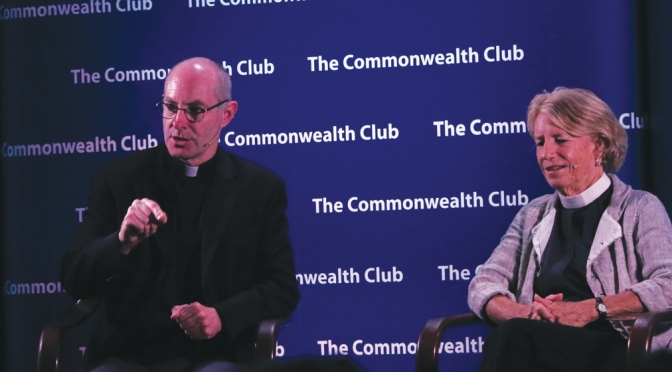Brian Healy
Staff Writer
Last week, The Commonwealth Club of California hosted a Climate One dialogue forum discussing the impact and importance Pope Francis plays in the climate change discussion, two weeks before he is due to make his highly-anticipated visit to the United States. USF President the Rev. Paul J. Fitzgerald, S.J., was welcomed as a guest speaker, along with Rev. Canon Sally Bingham, President and Founder of the Interfaith Power and Light Organization, and Sam Liccardo, Mayor of San Jose.
In 2007, The Commonwealth Club, which is the nation’s oldest and largest public affairs forum, founded a new division that is dedicated to the exclusive coverage and dialogue of energy, the environment and the economy. Since then, Climate One has been the branch responsible for bringing together top thinkers and motivators from national business, government, academia and advocacy groups to advance the discussion about a clean energy future. This past week these influencers came together to discuss the impact of the Pope’s encyclical, or papal letter sent to all bishops of the Roman Catholic Church, on the environment, the first of its kind devoted to the discussion of climate change.
Guest speakers were targeted all night with a barrage of questions. Fitzgerald was the first to be called on by Greg Dalton, the moderator and founder of Climate One, who asked him to explain integral ecology, one of the main themes of the Pope’s encyclical on the environment. Fitzgerald said, “What the Pope is calling us to do is to just simply be persons of integrity, and that we close the largest gap ever measured, the fourteen inches between the heart and the brain.”
After a brief chuckle from the audience, Fitzgerald continued, “So that what we know in our hearts, what we understand in our minds, what we say with our mouths, and what we do with our hands is all the same thing. It [ecological integrity] is just an integrated human existence.” It is this integrated human existence, and as Fitzgerald likes to say “connectedness,” that will lead to a cleaner and safer environment.
There are some obstacles in the way of achieving complete connectedness. Something the Pope considers dangerous is the heavy reliance on technology. “To seek only a technical remedy to each environmental problem which comes up is to separate what is in reality interconnected, and to mask the true and deepest problems of the global system,” the Pope said in the encyclical.
The moderator then asked Fitzgerald how he, as President of a university “full of technology-addicted students” saw the challenge of creating connectedness without the use of technology. Fitzgerald urged students to prevent climate change by raising awareness on school grounds, which will hopefully trickle down into the many professional careers USF students will take on.
“We have made the pledge as a university campus, and we are well on our way to becoming carbon neutral by the year 2050. We also just opened an Office of Campus Sustainability where members of facilities, faculty, and students can go get informed about such issues,” said Fitzgerald.
The President also spoke about what he hopes students achieve once they leave the classroom. “At USF, what we’re trying to do is to create a whole culture where, as we graduate our students, they gain this habit of being environmentally sensitive. I hope they would then choose pathways that would help inform the citizens, whether it is in the business world, public policy, going to science and healthcare but always looking for ways to lessen our carbon footprint.”
The evening ended for Fitzgerald after he was put on the spot by a USF alumnus, Grant Smith. Smith asked when the school would divest from coal and tar sand investments, since universities like San Francisco State University, Stanford University and the entire University of California school system had already pledged to abstain from future purchase of the fossil fuels. Fitzgerald cautiously responded that the University would divest in coal and tar sand soon enough. “We have a very small [investment in] coal in one instrument, and when that instrument matures we’ll be done,” said Fitzgerald.
Photo courtesy of Racquel Gonzales/Foghorn

